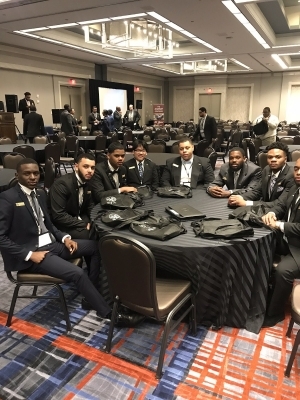“I am my brother’s keeper!”, the phrase that was echoed throughout a room filled with black and brown young men that possessed hunger, dedication, and resilience for striving to make a difference not only in their communities but also in neighboring communities and communities across the world that feature people of color.
Photo caption: Mr. Stafford (far left) in attendance at the Student African American Brotherhood (SAAB) Conference.
The Student African American Brotherhood (SAAB) conference in Atlanta, GA changed my life forever. That phrase was so meaningful and powerful to so many people in that room that day, that it will always resonate with me when I share my life experiences.
As a young black man growing up in a community that lacked resources, leadership, and solidarity, but was renowned for its violence and heavy policing of gang-affiliated people and children, I was in the heart of it all and had to navigate those conditions as an adolescent. Living in a single-parent household with my two older brothers, my mother had to sacrifice greatly in order for my brothers and I to have a decent upbringing. My mother is the epitome of “resilience” because she had to work long shifts just to put food on the table and clothes on our backs. Not having our fathers present in our lives made it extremely difficult for my mother, because she had to raise three young men in an environment where drugs, violence, and alcohol were so accessible, but she made sure we’d keep our heads on strong and were involved in the community, organizations, and sports.
“I am my brother’s keeper” is what led me to where I am today. Being a first-generation college student, let alone a college graduate, is beyond special to me because I understand the path it takes to get here, especially for students who come from low-income families and do not have an abundance of resources available to them. The road can be very challenging. My path to being a college graduate was far from perfect. Being placed on academic probation my first year of college was eye-opening for me as an 18 year old and having to leave abruptly as a result of that was terrifying, because from that exact moment, I considered myself a failure. A failure to my family, mentors, friends, and to myself. But sometimes, a hard fall is what you need to lift yourself back up, and that’s what I did. I was able to earn my Associate Degree at my local community college then transfer to Appalachian State where I earned my Bachelor’s Degree with honors in Broadcasting.
The road to prosperity is not easy, and to have the opportunity to help students with college access is beyond amazing. Most of these students are first-generation and come from a low-income family just as I did, and to be able to provide support, resources, and knowledge about college access is an invaluable experience. I’ve always told myself that some day I would be in the position to give back to my community and be a resource to them as many have been for me. As a senior in high school, I was not familiar with financial aid, college applications, RDS, and college access as a whole. Those things were like learning a new language. And like many of these students, those things are foreign to them as well, but with App CAC, I am placed in a position where I can assist students with understanding that process. This is only the beginning of my journey.
“I am my brother’s keeper.”
*By Shyheim Stafford, R-S Central High School adviser

